Toshiba DK14, DK40i, DK424 User Guide

High Quality Original Manuals for you
Visit us on the Internet sales@manuals -for-you.com
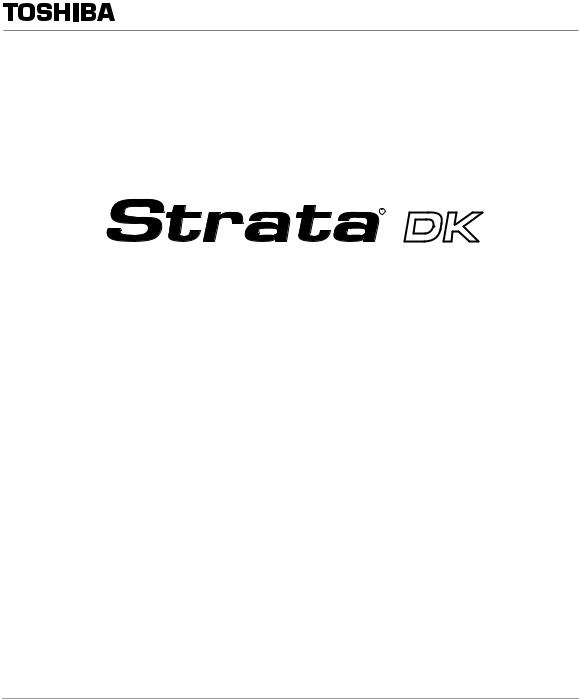
Telecommunication Systems Division
Digital Business Telephone Systems
System Administrator Guide
May 1999

Toshiba America Information Systems, Inc.
Telecommunication Systems Division
Limited Warranty
Toshiba America Information Systems, Inc., (“TAIS”) warrants that this telephone equipment (except for fuses, lamps, and other consumables) will, upon delivery by TAIS or an authorized TAIS dealer to a retail customer in new condition, be free from defects in material and workmanship for twelve (12) months after delivery. This warranty is void (a) if the equipment is used under other than normal use and maintenance conditions, (b) if the equipment is modified or altered, unless the modification or alteration is expressly authorized by TAIS, (c) if the equipment is subject to abuse, neglect, lightning, electrical fault, or accident, (d) if the equipment is repaired by someone other than TAIS or an authorized TAIS dealer, (e) if the equipment’s serial number is defaced or missing, or (f) if the equipment is installed or used in combination or in assembly with products not supplied by TAIS and which are not compatible or are of inferior quality, design, or performance.
The sole obligation of TAIS or Toshiba Corporation under this warranty, or under any other legal obligation with respect to the equipment, is the repair or replacement by TAIS or its authorized dealer of such defective or missing parts as are causing the malfunction with new or refurbished parts (at their option). If TAIS or one of its authorized dealers does not replace or repair such parts, the retail customer’s sole remedy will be a refund of the price charged by TAIS to its dealers for such parts as are proven to be defective, and which are returned to TAIS through one of its authorized dealers within the warranty period and no later than thirty (30) days after such malfunction, whichever first occurs.
Under no circumstances will the retail customer or any user or dealer or other person be entitled to any direct, special, indirect, consequential, or exemplary damages, for breach of contract, tort, or otherwise. Under no circumstances will any such person be entitled to any sum greater than the purchase price paid for the item of equipment that is malfunctioning.
To obtain service under this warranty, the retail customer must bring the malfunction of the machine to the attention of one of TAIS’ authorized dealers within the twelve (12) month period and no later than thirty (30) days after such malfunction, whichever first occurs. Failure to bring the malfunction to the attention of an authorized TAIS dealer within the prescribed time results in the customer being not entitled to warranty service.
THERE ARE NO OTHER WARRANTIES FROM EITHER TOSHIBA AMERICA INFORMATION SYSTEMS, INC., OR TOSHIBA CORPORATION WHICH EXTEND BEYOND THE FACE OF THIS WARRANTY. ALL OTHER WARRANTIES, EXPRESS OR IMPLIED, INCLUDING THE WARRANTIES OF MERCHANTABILITY, FITNESS FOR A PARTICULAR PURPOSE, AND FITNESS FOR USE, ARE EXCLUDED.
No TAIS dealer and no person other than an officer of TAIS may extend or modify this warranty. No such modification or extension is effective unless it is in writing and signed by the vice president and general manager, Telecommunication Systems Division.
Publication Information
Toshiba America Information Systems, Inc., Telecommunication Systems Division, reserves the right, without prior notice, to revise this information publication for any reason, including, but not limited to, utilization of new advances in the state of technical arts or to simply change the design of this document.
Further, Toshiba America Information Systems, Inc., Telecommunication Systems Division, also reserves the right, without prior notice, to make such changes in equipment design or components as engineering or manufacturing methods may warrant.
DKA-AG-SYSTEM-VD 4016160
Version D, May 1999
Version C, April 1998
Version B, October 1997
Version A, September 1996
© Copyright 1999
Toshiba America Information Systems, Inc. Telecommunication Systems Division
All rights reserved. No part of this manual, covered by the copyrights hereon, may be reproduced in any form or by any means—graphic, electronic, or mechanical, including recording, taping, photocopying, or information retrieval systems—without express written permission of the publisher of this material.
Strata is a registered trademark of Toshiba Corporation.
Trademarks, registered trademarks, and service marks are the property of their respective owners.

Contents
Introduction |
|
Equipment Notes ......................................................................................................... |
iii |
Organization ................................................................................................................ |
iv |
Conventions ................................................................................................................ |
iv |
Important Notes ........................................................................................................... |
v |
Related Documents ..................................................................................................... |
vi |
Chapter 1 Setting System Parameters |
|
Auto Attendant ............................................................................................................. |
1 |
Auto Attendant CO Line Assignments ..................................................................... |
2 |
System Auto Attendant Dialing Plan ........................................................................ |
3 |
Auto Attendant Announcement Recording Recommendations ................................ |
4 |
Direct Inward System Access (DISA) Security Code ................................................. |
4 |
Emergency 911 Calls ................................................................................................... |
6 |
Emergency Calling from the Attendant Console ...................................................... |
7 |
Night Transfer .............................................................................................................. |
8 |
Night Transfer Lock/Unlock Password .................................................................... |
8 |
Night Transfer Lock Mode ....................................................................................... |
9 |
Setting Date/Time/Day .............................................................................................. |
10 |
Soft Keys .................................................................................................................... |
12 |
Strata DK System Administrator’s Guide 5/99 |
i |

Contents |
|
Chapter 1 - Setting System Parameters |
|
Station Relocation ...................................................................................................... |
12 |
Automatic Relocation .............................................................................................. |
13 |
Relocation by Special Dial ...................................................................................... |
14 |
System Messages, Names and Memos ....................................................................... |
15 |
User LCD Name/Number Display .......................................................................... |
17 |
System Speed Dial Numbers ...................................................................................... |
20 |
Clearing a Speed Dial Entry .................................................................................... |
21 |
Accessing the Stored Number ................................................................................. |
21 |
Speed Dial—Advanced Features ................................................................................ |
21 |
Feature Access Codes ............................................................................................. |
21 |
Speed Dial Pause and Flash Storage ....................................................................... |
24 |
Speed Dial Number Linking ................................................................................... |
24 |
Speed Dial Memo .................................................................................................... |
27 |
Toll Restriction Override/Traveling Class Codes ...................................................... |
29 |
Verified Account Codes ............................................................................................. |
31 |
Appendix – Access Codes |
|
CO Line Access Codes ............................................................................................... |
33 |
Feature Access Codes ................................................................................................. |
34 |
Paging Group Codes ................................................................................................... |
35 |
Speed Dial Access Codes ........................................................................................... |
37 |
Appendix – Access Codes |
|
User Name/Number Directory ................................................................................... |
39 |
Speed Dial Memo Directory ....................................................................................... |
40 |
Telephone Location Record ....................................................................................... |
41 |
Index ............................................................................................................................... |
45 |
ii
Strata DK System Administrator’s Guide 5/99

Introduction
This guide is designed for the System Administrator of the following Strata DK systems:
♦DK14
♦DK16e/DK16
♦DK40i/DK40
♦DK424/DK280 (Release 3 and above)
This guide provides instructions for assigning the user names that appear on the station display; managing station relocation; and assigning Direct Inward System Access (DISA) security codes, toll restriction override access codes, and verified account codes.
Important! This guide contains information and procedures that are not available to the average telephone user. As System Administrator, you must have access to a specific System Administrator’s telephone to perform the procedures in this guide. Your responsible for certain proprietary codes for providing or restricting features to telephones with the Strata DK systems. This guide is not intended for general use; please keep it in a secure place.
You should also have a copy of the most recent Strata DK General Description for the appropriate system, as well as any related user guides. See “Related Documents” later in this Introduction.
Equipment Notes
♦Most of the operations in this guide require a Liquid Crystal Display (LCD) digital telephone at the System Administrator’s work station.
Strata DK System Administrator’s Guide 5/99 |
iii |

Introduction
Organization
♦Typically, use the station with [PDN] 10, 100, or 200 to perform the functions in this guide. This guide assumes the Adminstrator’s telephone is connected to station Port 000. If you w‘ish, you can use a different [PDN] which must be assigned by the system installer. In any case, the station is referred to as the “Administrator station” throughout this guide. Ask your system installer which station this is.
Organization
This guide is divided as follows:
♦Chapter 1 – Setting System Parameters contains descriptions and procedures for changing System Administrator-specific parameters. These parameters are given in alphabetical order.
♦Appendix A – Access Codes provides feature access code sequences which can be stored onto SD buttons for one-touch feature access.
♦Appendix B – Directories/Record provides blank directories for recording User Names/Numbers and Speed Dial memos, and telephone locations and instructions for displaying [DN], physical port, and logical port information.
Conventions
The left column gives you the single or numbered steps you need to perform a procedure.
The right column gives the immediate response to your action. It includes readouts from the LCD telephone when applicable, and additional notes and comments.
Note Elaborates specific items or references other information.
Important! Calls attention to important instructions or information.
iv
Strata DK System Administrator’s Guide 5/99
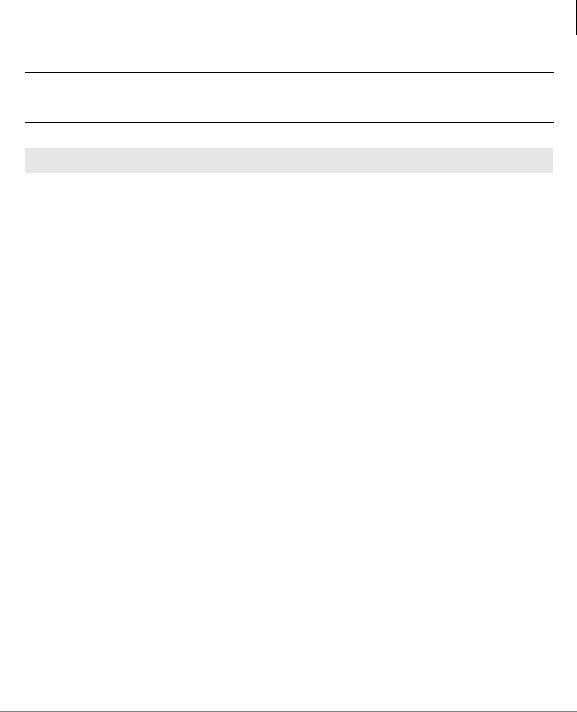
Introduction
Important Notes
CAUTION! Advises you that hardware, software applications, or data could be damaged if the instructions are not followed closely.
WARNING! Alerts you when the given task could cause personal injury or death.
Letters in [brackets] represent buttons which have Directory Numbers on them. For example:
[PDN] |
Primary Directory Number button (the Extension Number for your |
|
telephone). |
[SDN] |
Secondary appearance of a [PDN]. A [PDN] which appears on |
|
another telephone is considered an [SDN]. |
[PhDN] |
Phantom Directory Number button (an additional Directory Number). |
[DN] |
any Directory Number button (also known as an Extension or |
|
Intercom Number). When [DN] is used in an operating procedure, the |
|
procedure applies to any [PDN], [SDN], or [PhDN]. |
([WUD EROG |
letters represent telephone buttons. For example: . |
|
denotes the step in a one-step procedure. |
~ |
means “through”. For example: 5~10. |
+ |
is used for multiple key entries. |
|
Example: Press 6SHHG 'LDO + ;; + 5HGLDO + 6SNU (;; = 08~60 |
|
seconds). |
Important Notes
♦Because feature buttons are flexible and must be programmed by a system installer, your telephone may not have all of the buttons mentioned in this guide.
♦Use the button if your telephone does not have a 5HGLDO button.
♦Use the button if your telephone does not have a 6SHHG 'LDO button.
Strata DK System Administrator’s Guide 5/99 |
v |

Introduction
Related Documents/Media
Related Documents/Media
Refer to the following documents for more information:
♦General Description
♦Digital Telephone User Guide (includes LCD, Add-on Module and Direct Station Select Console)
♦Digital Telephone Quick Reference Guide
♦Digital Single Line Telephone User Guide
♦PC-DKT User Guide
♦Electronic Telephone User Guide (includes LCD and Direct Station Select Console)
♦Electronic Telephone Quick Reference Guide
♦Standard Telephone User Guide
♦PC/Data Interface User Guide
♦Cordless Digital Telephone User Guide
♦HMIS User Guide
♦HMIS Quick Reference Guide
♦Strata AirLink Integrated Wireless Handset User Guide (handset configured to digital ports of the Strata DK telephone system)
♦Strata AirLink Integrated Wireless Handset Quick Reference Guide
♦Strata AirLink External Wireless Handset User Guide (handset configured to digital ports of the Strata DK telephone system)
♦Strata AirLink External Wireless Handset Quick Reference Guide
♦Strata DK Library CD-ROM
vi
Strata DK System Administrator’s Guide 5/99

Setting System Parameters |
1 |
|
|
For security reasons, you can add, delete or change system parameters. Make sure your system is programmed so that you can change these parameters from your telephone.
The parameters discussed in this chapter are given in alphabetical order. They are:
♦Auto Attendant
♦Direct Inward System Access (DISA) Security Code
♦Night Transfer
♦Setting Date/Time/Day
♦Soft Keys
♦Station Relocation
♦System Messages, Names and Memos
♦System Speed Dial Numbers
♦Toll Restriction Override/Traveling Class Codes
♦Verified Account Codes
Auto Attendant
The Auto Attendant feature tells the system where to direct incoming Auto Attendant calls. The Strata DK built-in Auto Attendant is licensed by Dytel, Inc. under United States
Strata DK System Administrator’s Guide 4/99 |
1 |

Setting System Parameters
Auto Attendant
Patent No. 4,975,941. Two announcements greet callers: The primary announcement contains the company greeting, followed by a menu. The secondary (optional) announcement, plays when the station or department called is not available. It is then followed by a menu.
An Auto Attendant’s primary announcement may sound like this:
“Hello, you have reached Toshiba.
If you know the number of the party you are calling, please dial it now. For operator assistance, dial 0 or please wait.
For Sales, dial 3.
For Marketing, dial 4.
And for Technical Support, dial 5.”
Here’s an example of an Auto Attendant's secondary announcement:
“The party is unavailable...
For operator assistance, dial 0 or wait for assistance. For Sales, dial 3.
For Marketing, dial 4.
And for Technical Support, dial 5.”
Auto Attendant CO Line Assignments
CO lines can be assigned to be answered by the Auto Attendant in any of the three system modes (Day, Day 2, and Night) by the system programmer. The 1LJKW 7UDQVIHU button
can be used to switch the CO lines to ring the Auto Attendant or to ring stations that are preassigned in system programming.
The Auto Attendant can be configured (in system programming) to answer CO line calls on a delayed basis (12 or 24 seconds) if the call is not answered at a ringing station(s).
2 |
Strata DK System Administrator’s Guide 4/99 |

Setting System Parameters
Auto Attendant
System Auto Attendant Dialing Plan
The Auto Attendant dialing plan is assigned in system programming. Use Table 1 to record your system Auto Attendant dialing plan. Toshiba recommends using single digits. (See Table 2 for a list of default [DNs] for Strata DK systems.)
Table 1 |
Auto Attendant Menu |
|
|
|
|
|||
|
|
|
|
|
|
|
|
|
|
|
Dialed Digit |
|
Station (Directory) |
|
Department, Division, etc. |
||
|
(Menu Prompts) |
|
Number |
|
|
|||
|
|
|
|
|
|
|||
|
0 |
|
|
|
|
|
|
|
|
|
|
|
|
|
|
|
|
|
1 |
|
|
|
|
|
|
|
|
|
|
|
|
|
|
|
|
|
2 |
|
|
|
|
|
|
|
|
|
|
|
|
|
|
|
|
|
3 |
|
|
|
|
|
|
|
|
|
|
|
|
|
|
|
|
|
4 |
|
|
|
|
|
|
|
|
|
|
|
|
|
|
|
|
|
5 |
|
|
|
|
|
|
|
|
|
|
|
|
|
|
|
|
|
6 |
|
|
|
|
|
|
|
|
|
|
|
|
|
|
|
|
|
7 |
|
|
|
|
|
|
|
|
|
|
|
|
|
|
|
|
|
8 |
|
|
|
|
|
|
|
|
|
|
|
|
|
|
|
|
|
9 |
|
|
|
|
|
|
|
|
|
|
|
|
|
|
|
|
|
* |
|
|
DISA Outgoing Calls |
Outgoing line (see Caution note below) |
|||
|
|
|
|
|
|
|
|
|
Table 2 |
Default DNs for Strata DK |
|
|
|
|
|||
|
|
|
|
|
|
|
||
|
|
System |
[PDNs] (default) |
[PhDNs] (default) |
||||
|
DK14 |
|
a |
|
a |
|||
|
|
|
|
|
||||
|
DK16e/DK16/DK40i/DK40 |
a |
|
a |
||||
|
|
|
|
|
||||
|
DK424 RCTUBA/BB, RCTUC/D |
a |
|
a |
||||
|
|
|
|
|
|
|||
|
DK424 (RCTUE/F) |
|
a |
|
a |
|||
|
|
|
|
|
|
|
|
|
Strata DK System Administrator’s Guide 4/99 |
3 |

Setting System Parameters
Direct Inward System Access (DISA) Security Code
When calling the Auto Attendant, callers can access DISA by dialing . Toshiba recommends that you do not include this information in the Auto Attendant announcement.
CAUTION! Make sure that your system DISA security code is set and protected. This is necessary to prevent unauthorized outgoing DISA calls from being charged (billed) to your company’s telephone lines. See the instructions, “Direct Inward System Access (DISA) Security Code” on Page 4.
Auto Attendant Announcement Recording Recommendations
Primary announcements are played to the caller when the Auto Attendant first answers a CO line. Secondary announcements (optional) are played to the caller after dialing a busy or unanswered station. Announcements should be kept as short as possible to allow fast call handling, and to eliminate overflow situations. Typical announcements should run between 10 and 20 seconds. Both primary and secondary announcements should play the Auto Attendant dialing plan options.
If many CO lines ring the Auto Attendant (heavy traffic), multiple announcement machines can be installed to accommodate quick answer of incoming calls. Announcements can be up to 60 seconds in length. The system can support up to four primary announcements and up to four secondary announcements, thereby making a 15second call answering time possible. All primary announcements should play the same message/dial prompts, and all secondary should play the same secondary announcement. Follow the announcement device manufacturer's instructions to record the auto attendant announcements.
Direct Inward System Access (DISA) Security
Code
The Direct Inward System Access feature is used when calling into your system from the outside. This feature is available on certain CO lines and from the built-in Auto Attendant. Assignments are made by the system programmer. CO lines can be DISA lines in the Day, Day 2, or Night mode, or any combination of these modes.
4 |
Strata DK System Administrator’s Guide 4/99 |
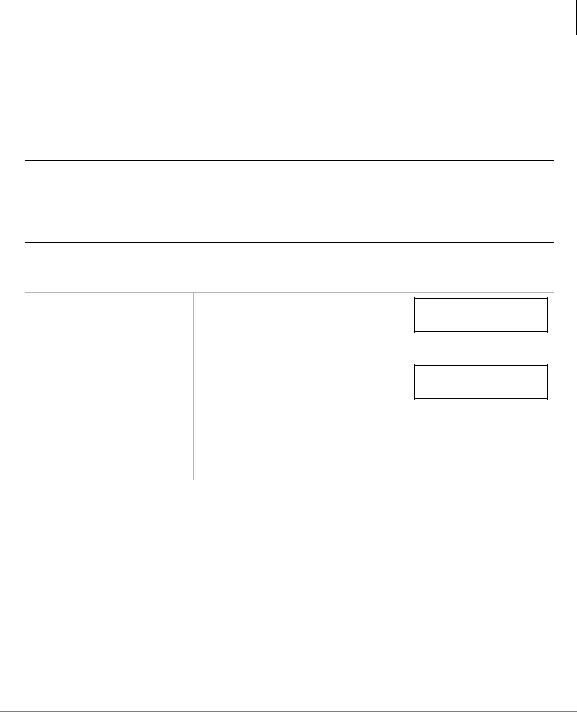
Setting System Parameters
Direct Inward System Access (DISA) Security Code
If a caller enters the system via a DISA line or built-in Auto Attendant, the caller can then access another line to place an outgoing call through the system, in which case the outgoing line call is charged as a call made from the DK system. To prevent unauthorized outgoing calls through the system using the DISA feature, enter a DISA security code as shown in the following steps.
CAUTION! Whenever the built-in Auto Attendant is installed, the DISA security code should be used (and changed periodically) to prevent unauthorized access of outgoing CO lines via the Auto Attendant DISA access feature.
To enter or change the DISA security code
1.Press [DN] + .
2.Dial the new DISA security code (1~15 digits).
3.Press 5HGLDO.
4.Press 6SNU.
You hear a confirmation tone.
The DISA security code digit length is a system program option. The code appears on the LCD as you enter it.
You hear a confirmation tone.
NO. NNN
____ ID CODE SET
NO. NNN DATA PROGRAMMED
The telephone returns to the idle mode.
To cancel the DISA security code
1. |
Press [DN] + . |
You hear a confirmation tone. |
2. |
Press 5HGLDO. |
The telephone returns to the idle mode. |
3. |
Press 6SNU. |
|
|
|
|
Strata DK System Administrator’s Guide 4/99 |
5 |
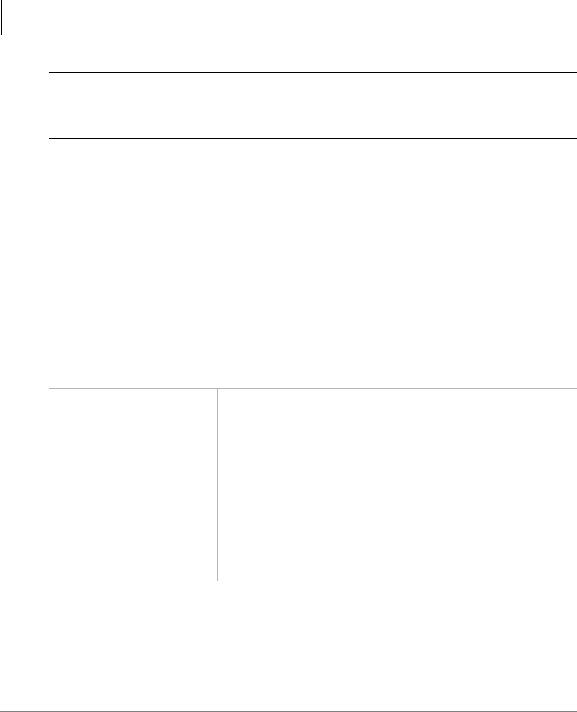
Setting System Parameters
Emergency 911 Calls
CAUTION! If the DISA security is canceled, outgoing unrestricted CO Line access is available to anyone calling in on a DISA line or built-in Auto Attendant.
Emergency 911 Calls
The procedure to make an emergency 911 call is the same for the Strata DK14, DK40i/ DK40 and DK424; however, the DK424 can be programmed to use a special outside line, called the CAMA trunk, which provides Enhanced 911 (E911) calling service.
The DK424’s E911 feature performs the following set of actions when a user dials 911: the DK seizes an idle CAMA trunk and sends 911 plus the dialing station’s Caller Emergency Service Identification (CESID) over the CAMA trunk to the 911 emergency operator. This allows the 911 emergency operator to know the exact location (room, building, etc.) of the telephone originating the 911 call.
To make an Emergency 911 call
1.Press [DN] + The [PDN] releases from the internal connection and
seizes the CAMA trunk.
|
Note Once a 911 call is started, most other buttons/keys |
|
on a telephone are disabled to prevent accidentally |
|
dropping the 911 call attempt. This includes the |
|
+ROG button, so that the 911 call cannot be put on |
|
hold. |
...or go off hook and |
Off Hook and dial 911 (station has off hook selection of a |
enter |
CO line or line group in Program 32 and has a CO /LQH or |
|
3RROHG /LQH buttons). |
6 |
Strata DK System Administrator’s Guide 4/99 |

Setting System Parameters
Emergency 911 Calls
If your off hook selection automatically selects a /LQH 3RROHG /LQH button, then when you dial 911, the normal
CO line is dropped and an idle PDN or CAMA CO button connects to the CAMA trunk.
If an idle [PDN] or CAMA CO button is not available, the 911 call is sent out the originally selected line without the station’s CESID information.
...or press [DN] + + If the system uses Least Cost Routing (LCR) – When
. is dialed, the station seizes LCR on its [PDN]. When you enter , the PDN drops LCR and the same [PDN] connects to the CAMA trunk. 911 plus the station’s CESID will be sent out the CAMA trunk.
If the system does not use LCR or if the station does not have a CO /LQH, 3RROHG /LQH or CAMA CO buttons –
when a is dialed as an access code, the station seizes a “dial 9” CO line on its [PDN]. When is entered, the 911 call will be sent one of two ways:
♦If the station does not have another idle [PDN] or CAMA CO button, the 911 call will be sent out the normal CO line in the dial 9 line group without the station’s CESID.
♦If the telephone has another [PDN] or CAMA CO button, and it is idle, the first PDN will drop and the second [PDN] or CAMA CO button will be connected to the CAMA trunk. 911 plus the station’s CESID will be sent out the CAMA trunk.
Emergency Calling from the Attendant Console
The PC attendant console and the DK attendant console can be programmed make E911 calls two different ways, by using either CO line buttons or the INT button to initiate the call. The procedure and results are described below:
From the attendant console, the Attendant can press:
♦a CO /LQH, 3RROHG /LQH or CAMA CO button and dial 911. When 911 is dialed from an outgoing line button, the outgoing line button drops and the CAMA trunk is
Strata DK System Administrator’s Guide 4/99 |
7 |

Setting System Parameters
Night Transfer
seized on the INT button. 911 plus the Attendant Console CESID is sent out the CAMA trunk.
♦...or the ,17 or [PDN] button and dial 911. When 911 is dialed, the ,17 or [PDN] releases from the internal connection and seizes the CAMA trunk. 911 plus the Attendant Console CESID is sent out the CAMA trunk.
Night Transfer
Incoming calls to your system can be made to route and ring different destinations, based on either twoor three-call routing (ringing) patterns (set in system programming). The Night Transfer LED indicates the active routing pattern:
|
Three-pattern |
Two-pattern |
|
|
|
DAY |
OFF |
OFF |
|
|
|
DAY 2 |
FLASH |
N/A |
|
|
|
NIGHT |
ON |
ON |
|
|
|
Night Transfer can be locked by pressing 17 /RFN a and dialing the NT Lock password (see the procedure outlined on the following page).
If the system has tenant service, up to four Tenant Night Transfer buttons (1LJKW 7UDQVIHU a ) can be assigned and controlled independently.
To enable/disable night transfer
Press 1LJKW 7UDQVIHU to toggle night transfer ON/OFF.
Night Transfer Lock/Unlock Password
The Night (NT) Lock/Unlock mode enables the Administrator’s station or an attendant console to lock the system into the Day, Day 2, or Night mode. By setting the system into different modes, incoming CO calls can be routed to different destinations.
In order for the Administrator station or the attendant console to perform such routing, it must be assigned with 1LJKW 7UDQVIHU and 17 /RFN buttons via system programming. Up to four 1LJKW 7UDQVIHU and 17 /RFN buttons are allowed. Check with the system
installer for any additional information.
8 |
Strata DK System Administrator’s Guide 4/99 |
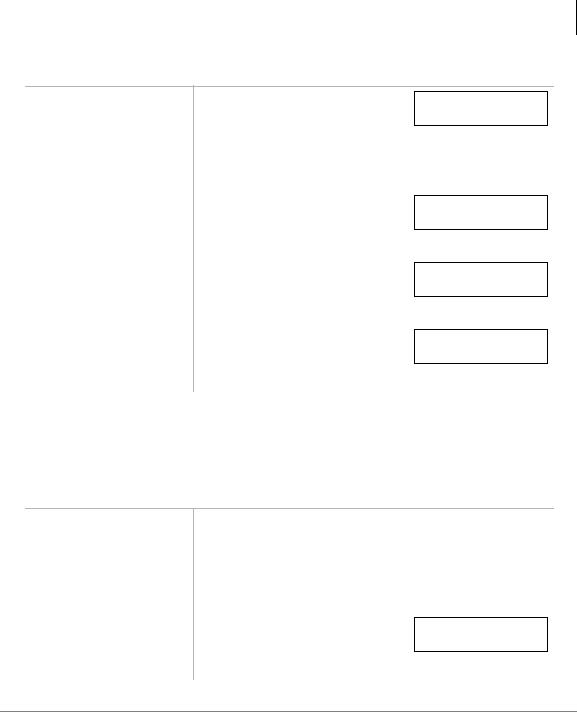
Setting System Parameters
Night Transfer
To assign or change Night Lock/Unlock Password
1.Press a [DN] +
;
(X = Tenant 1~Tenant 4 CO line groups), with the handset onhook.
2.Enter a four-digit password.
3.Press 5HGLDO.
4.Hang up.
The LCD prompts you to enter a four-digit password.
As you are enter the password, the digits display on the LCD.
You hear confirmation tone.
The password is assigned.
NO.200 ENTER PASS CODE
NO.200
XXXX
NO.200 DATA PROGRAMMED
NO.200 JAN 15 WED 02:00
Night Transfer Lock Mode
After setting the 1LJKW 7UDQVIHU button into the desired ring mode (Day/Day2/Night), you can lock Night Transfer using the accompanying steps below.
To set the system in Night Lock Mode
1.Press 1LJKW 7UDQVIHU to set the system into the Day or Day2 or Night Mode, with the handset on-hook.
2.Press 17 /RFN.
The NT Lock LED flashes. The LCD prompts you to enter your password.
NO.200 ENTER PASSWORD
Strata DK System Administrator’s Guide 4/99 |
9 |
